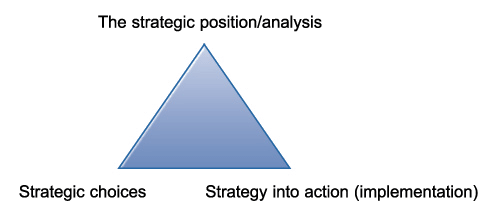Strategy into action
"Strategy into action" is a key step in the strategic planning process:

Strategy into action (implementation)
Johnson, Scholes and Whittington
Johnson, Scholes and Whittington see implementing a strategy as having three key elements.
- Organising for success. For example, should the organisation be split into European, US and Asian divisions? How autonomous should divisions be? What parenting style would be appropriate?
- Enabling success. An organisation's resources should support the chosen strategy. For example, appropriate human resources and fixed assets need to be acquired.
- Managing strategic change. Most strategic planning and implementation will involve change, so managing change, in particular employees' fears and resistance, is crucial.
Organising for success
Key questions under "organising for success" are the following:
Does the firm need to change its organisational structure?
Different types of organisational structure are discussed here. It may be that a new strategy means that an organisation should switch from a functional structure to a divisional one, for example.
How should key relationships be managed?
Within the new structure there are still key questions to resolve, for example:
- What degree of centralisation required?
- What parenting style would be most appropriate?
What control measures are required to ensure strategy is delivered?
Long-term strategic plans need to be translated into tactical and operational plans and targets. An effective performance management system will ensure that progress towards the strategy can be monitored and controlled. The idea is that beating short term operational targets will result in medium term targets being met which hopefully means that the long term strategic goals are achieved.
This will involve identifying critical success factors and setting up appropriate key performance indicators.
Enabling success
Enabling success is concerned with the two way relationship between overall business strategies and strategies in different resource areas such as people, information, finance and technology. This is a two way process as not only do the implications of a strategy have to be worked out - e.g. how the new strategy impacts technology needs - but changes at a functional level may drive strategy - e.g. how can e-business transform our market penetration? The latter is particularly important if strategy is driven by a focus on core competences, or if a more emergent approach is favoured.
On a more general note, business strategies need to be translated into functional strategies for marketing, HR, IT, etc.
Managing strategic change
Successful implementation will rely on the successful management of the change to the new strategy. This will involve not only the management of the systems and structures of the organisation, but also the management of its people and routines. This will involve two elements:
- overcoming resistance to change from staff
- leading staff in a manner that encourages them to make the change successfully.
In addition there may be changes needed to business processes.
Emergent strategies
The research of Mintzberg (1987) suggests that few of the strategies followed by organisations in the real world are as consciously planned as the approaches above suggest.
He believes this to be an unrealistic view of strategic planning, believing instead that strategies evolve over time (emerge) rather than result from an in-depth analysis of every aspect of the environment and an impartial evaluation of every possible alternative.
Emergent strategies are discussed in more here.
|
Created at 10/11/2012 4:29 PM by System Account
(GMT) Greenwich Mean Time : Dublin, Edinburgh, Lisbon, London
|
Last modified at 9/11/2013 12:17 PM by System Account
(GMT) Greenwich Mean Time : Dublin, Edinburgh, Lisbon, London
|
|
|
|
 |
Rating
:
|
 Ratings & Comments
(Click the stars to rate the page) Ratings & Comments
(Click the stars to rate the page)
|
 |
Tags:
|
|
|
|
|